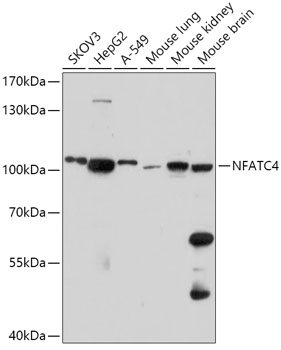Cell Biology Antibodies 13
Anti-NFATC4 Antibody (CAB17511)
- SKU:
- CAB17511
- Product Type:
- Antibody
- Reactivity:
- Human
- Reactivity:
- Mouse
- Host Species:
- Rabbit
- Isotype:
- IgG
- Antibody Type:
- Polyclonal Antibody
- Research Area:
- Cell Biology
Description
| Antibody Name: | Anti-NFATC4 Antibody |
| Antibody SKU: | CAB17511 |
| Antibody Size: | 20uL, 50uL, 100uL |
| Application: | WB |
| Reactivity: | Human, Mouse |
| Host Species: | Rabbit |
| Immunogen: | Recombinant fusion protein containing a sequence corresponding to amino acids 560-710 of human NFATC4 (NP_004545.2). |
| Application: | WB |
| Recommended Dilution: | WB 1:500 - 1:2000 |
| Reactivity: | Human, Mouse |
| Positive Samples: | SKOV3, HepG2, A-549, Mouse lung, Mouse kidney, Mouse brain |
| Immunogen: | Recombinant fusion protein containing a sequence corresponding to amino acids 560-710 of human NFATC4 (NP_004545.2). |
| Purification Method: | Affinity purification |
| Storage Buffer: | Store at -20°C. Avoid freeze / thaw cycles. Buffer: PBS with 0.02% sodium azide, 50% glycerol, pH7.3. |
| Isotype: | IgG |
| Sequence: | QGGG KVVS VQAA SVPI ECSQ RSAQ ELPQ VEAY SPSA CSVR GGEE LVLT GSNF LPDS KVVF IERG PDGK LQWE EEAT VNRL QSNE VTLT LTVP EYSN KRVS RPVQ VYFY VSNG RRKR SPTQ SFRF LPVI CKEE PLPD SSLR GFPS ASAT PFG |
| Gene ID: | 4776 |
| Uniprot: | Q14934 |
| Cellular Location: | |
| Calculated MW: | |
| Observed MW: | 108kDa |
| Synonyms: | NF-AT3, NF-ATC4, NFAT3, NFATC4 |
| Background: | This gene encodes a member of the nuclear factor of activated T cells (NFAT) protein family. The encoded protein is part of a DNA-binding transcription complex. This complex consists of at least two components: a preexisting cytosolic component that translocates to the nucleus upon T cell receptor stimulation and an inducible nuclear component. NFAT proteins are activated by the calmodulin-dependent phosphatase, calcineurin. The encoded protein plays a role in the inducible expression of cytokine genes in T cells, especially in the induction of interleukin-2 and interleukin-4. Alternative splicing results in multiple transcript variants. [provided by RefSeq, Jan 2014] |
| UniProt Protein Function: | NFAT3: a transcription factor that plays a role in the inducible expression of cytokine genes in T cells, especially in the induction of the IL-2 and IL-4. Also control gene expression in embryonic cardiac cells. Could regulate not only the activation and proliferation but also the differentiation and programmed death of lymphoid and nonlymphoid cells. Highly expressed in placenta, lung, kidney, testis and ovary. Weakly expressed in spleen and thymus. Not expressed in peripheral blood lymphocytes. 23 alternatively spliced isoforms of the human protein hve been reported. |
| UniProt Protein Details: | Protein type:Transcription factor; DNA-binding Chromosomal Location of Human Ortholog: 14q11.2 Cellular Component: cytoplasm; cytosol; intermediate filament cytoskeleton; nucleus; transcription factor complex Molecular Function:peroxisome proliferator activated receptor binding; protein binding; transcription coactivator activity; transcription factor binding Biological Process: calcineurin-NFAT signaling pathway; cellular respiration; DNA damage response, signal transduction resulting in induction of apoptosis; heart development; inflammatory response; muscle cell development; negative regulation of dendrite morphogenesis; negative regulation of transcription from RNA polymerase II promoter; patterning of blood vessels; positive regulation of transcription from RNA polymerase II promoter; positive regulation of tumor necrosis factor production; regulation of synaptic plasticity; smooth muscle cell differentiation; transcription from RNA polymerase II promoter |
| NCBI Summary: | This gene encodes a member of the nuclear factor of activated T cells (NFAT) protein family. The encoded protein is part of a DNA-binding transcription complex. This complex consists of at least two components: a preexisting cytosolic component that translocates to the nucleus upon T cell receptor stimulation and an inducible nuclear component. NFAT proteins are activated by the calmodulin-dependent phosphatase, calcineurin. The encoded protein plays a role in the inducible expression of cytokine genes in T cells, especially in the induction of interleukin-2 and interleukin-4. Alternative splicing results in multiple transcript variants. [provided by RefSeq, Jan 2014] |
| UniProt Code: | Q14934 |
| NCBI GenInfo Identifier: | 215274090 |
| NCBI Gene ID: | 4776 |
| NCBI Accession: | Q14934.2 |
| UniProt Secondary Accession: | Q14934,B4DDG5, B4DY55, B5B2U7, B5B2U8, B5B2U9, B5B2V0 B5B2V1, B5B2V2, B5B2V3, B5B2V4, B5B2V5, |
| UniProt Related Accession: | Q14934 |
| Molecular Weight: | 8,950 Da |
| NCBI Full Name: | Nuclear factor of activated T-cells, cytoplasmic 4 |
| NCBI Synonym Full Names: | nuclear factor of activated T-cells 4 |
| NCBI Official Symbol: | NFATC4 |
| NCBI Official Synonym Symbols: | NFAT3; NF-AT3; NF-ATC4 |
| NCBI Protein Information: | nuclear factor of activated T-cells, cytoplasmic 4 |
| UniProt Protein Name: | Nuclear factor of activated T-cells, cytoplasmic 4 |
| UniProt Synonym Protein Names: | T-cell transcription factor NFAT3; NF-AT3 |
| Protein Family: | Nuclear factor of activated T-cells |
| UniProt Gene Name: | NFATC4 |
| UniProt Entry Name: | NFAC4_HUMAN |







